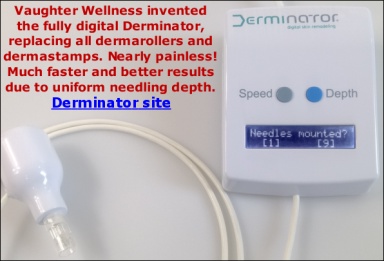Edelgard Liebl registered on the 29th of August, 2006 the word trademark "TOP-ROL DERMAROLLER" as an EU trademark.
And on the 19th of November, 2008 he registered a picture mark with the word "Dermaroller" prominently visible as a EU trademark.
On April 8, 2008, he registered the word "Dermaroller" as a US trademark.
On this basis, Cynergy, the US agent of Dermaroller S.a.r.l. has filed lawsuits against the sellers of dermarollers in the US:
https://http://www.dermarollerus.com/press/dermaroller-enforcing-us-trademarkshttps://http://www.justanswer.com/intellectual-property-law/4sdip-hi-paul-linda-robison-here-in-august-2009-asked.htmlhttps://http://www.articlesnatch.com/Article/Dermaroller---Files-First-Wave-Of-Federal-Trademark-Lawsuits-Against-Online-Micro-needle-Resellers/2217572We are quite sure these suits will be found without merit, we are quite sure Dermaroller S.a.r.l. knows this, and we think that the only reason the lawsuits have been filed is to bankrupt small dermaroller vendors to spend money on legal representation, and discourage others to stop selling dermarollers.
The reason is that the "Dermaroller" trademark simply is not a valid legal trademark, even though it has been registered as such in the US (not in Europe). Only when a trademark becomes contested, or when a trademark infringement lawsuit takes place, it will become known whether a trademark actually qualifies for legal protection. It is the same with patents. Anyone who pays the fees can file a patent or trademark, even when they are obviously non-enforceable. The trademark registration office does not verify whether a trademark qualifies for protection - they just register.
Let's look at US trademark law:
https://http://cyber.law.harvard.edu/metaschool/fisher/domain/tm.htm
"a generic mark is a mark that describes the general category to which the underlying product belongs. For example, the term "Computer" is a generic term for computer equipment. Generic marks are entitled to no protection under trademark law. Thus, a manufacturer selling "Computer" brand computers (or "Apple" brand apples, etc.) would have no exclusive right to use that term with respect to that product. Generic terms are not protected by trademark law because they are simply too useful for identifying a particular product. Giving a single manufacturer control over use of the term would give that manufacturer too great a competitive advantage. ""Dermaroller" is such a generic mark. It simply means "Skin roller". Derma = Greek for skin.
Therefore, the word "Dermaroller" is a generic, descriptive term for the actual product Dermaroller S.a.r.l. sells, and can't possibly qualify for trademark protection.Dermaroller S.a.r.l. never trademarked the single word "Dermaroller" in Europe, so European vendors do not have to fear a lawsuit.
"Dermaroller" may also perhaps be considered or claimed to be a descriptive mark, and also in that case, Dermaroller S.a.r.l. does not enjoy legal trademark protection on the term:
"A descriptive mark is a mark that directly describes, rather than suggests, a characteristic or quality of the underlying product (e.g. its color, odor, function, dimensions, or ingredients). For example, "Holiday Inn," "All Bran," and "Vision Center" all describe some aspect of the underlying product or service (respectively, hotel rooms, breakfast cereal, optical services). They tell us something about the product. Unlike arbitrary or suggestive marks, descriptive marks are not inherently distinctive and are protected only if they have acquired "secondary meaning." Descriptive marks must clear this additional hurdle because they are terms that are useful for describing the underlying product, and giving a particular manufacturer the exclusive right to use the term could confer an unfair advantage.
A descriptive mark acquires secondary meaning when the consuming public primarily associates that mark with a particular producer, rather than the underlying product."It is easy to show that the word "Dermaroller" has been used, worldwide, by consumers to mean any type of microneedling skin roller, and not specifically and near-exclusively the products of Dermaroller S.a.r.l.
We can prove this by doing a Google forum search on a date range stopping at the registration dates of their trademarks:
In 2001:
https://http://board.beauty24.de/showthread.php?t=8626In 2002:
https://http://www.hairlosshelp.com/FORUMS/messageview.cfm?catid=31&threadid=11545So the word "Dermaroller" was already genericized before their trademark application, and certainly is genericized today, which is amply obvious to anyone doing an online search for the term. Genericized trademarks lose their protection under US trademark law:
https://http://en.wikipedia.org/wiki/Genericized_trademarkSo what is the status of the alleged "Dermaroller" trademark?
In the EU: No single "Dermaroller" word trademark has ever been registered.
In the US: A "Dermaroller" trademark has been registered but it never fulfilled the legal requirements for registration, so it can't be enforced. Any court cases will be lost by Dermaroller S.a.r.l., if any trademark attorney worth his salt will get involved.
What does this all mean for us, OwnDoc.com? We operate a Seychelles Limited. That company came with a US correspondence address (listed on our website), but we do not have a physical presence in the US. We dispatch from Europe and we pay tax in Europe.





